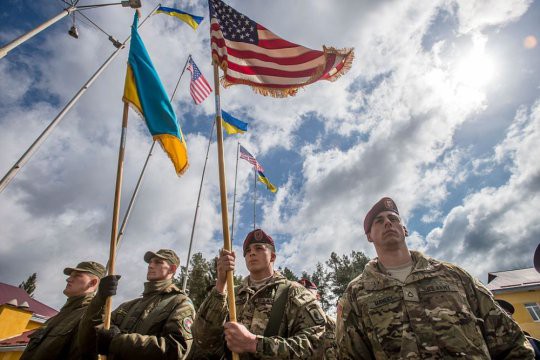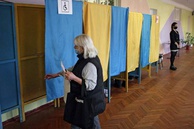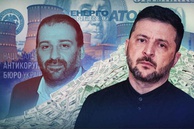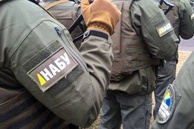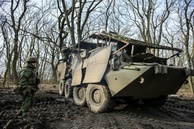The Ukrainian crisis is seen by the West just as a geopolitical game and an unfortunate failure to fulfill its plans. Therefore, the West will now be counting on the time factor. Well, this is exactly what they did before, patiently waiting for decades to see the Soviet Union breaking up. This time round, the West intends to pull off the very same trick for the second (or rather the third) time, because the Russian Empire was destroyed from within by the revolutionary movement inside and by the war outside. They are ready to wait, but as they do so, they will certainly not be sitting back doing nothing. The West has been faced with a harsh reality, as the combination of sanctions and war failed to destroy Russia, its economy, weaken the government and precipitate a coup. Just the very opposite happened. The West was not staking on a military triumph for Ukraine, although at a certain point it got dizzy from success after the agreements clinched in Istanbul were torn up, the Russian Army retreated to the left bank of the Dnieper in the Kherson region, the Ukrainian forces managed to build up their strength and advanced in the Kharkov region. Heady with their initial progress, they thought they would now be able to “defeat Russia on the battlefield” and launched a counteroffensive.
“Being on a roll, the globalists approved a plan for a large-scale Ukrainian counteroffensive. During the winter of 2022-2023, tank, artillery and missile units were set up, and new, highly motivated Ukrainian brigades were trained in Western Europe. Just how all this ended we know all too well. Kyiv’s operation fell through and became a turning point in the conflict. Having failed to achieve its military goals, Kyiv lost the trust of its sponsors, who realized how right they were from the very start when they believed that Ukraine would never be able to win this conflict on the battlefield.”[i]
Sergei Poletaev, an expert with the Vatfor Telegram channel [ii] and a member of the Russian International Affairs Council, said that the West initially did not believe in Ukraine's victory on the battlefield: "If the West was counting on Ukraine's military triumph, it should have provided Kyiv with as much military assistance as possible. History amply proves this point. For example, after its troop withdrawal, the West provided South Vietnam with about 3,000 aircraft and helicopters, 200 ships, more than 2,500 combat boats, more than 1,000 tanks, up to 2,500 towed and self-propelled artillery pieces, and about 100,000 heavy vehicles, as well as other equipment. Compare this with the situation in Ukraine, where receiving a dozen obsolete fighters or two dozen old tanks is a major event."
The only explanation is the Western desire to prevent Russia from achieving its goals, without entering into a direct military conflict with it.
The militarization of Ukraine aimed at clawing Donbass back by force stemmed from a NATO forecast that, having stood up for Ukraine’s pro-Russian eastern region, Moscow would get bogged down in battles in densely built-up areas, while the Ukrainian army would have many fortified areas, like Avdiivka, behind its back, and that the conflict would not spread beyond Donbass. Because they would not have enough resources even to liberate Donbass, which is peppered with large and small fortresses. However, the Russian army struck first, and high-precision weapons spread the confrontation to the entire territory of Ukraine, creating logistical problems, decimating the country’s energy and industrial potential, and seriously impacting public sentiment and the political situation there.
All the West can do right now is keep sending aid to Ukraine, while Kyiv tries to hold the front. At the same time, the West is testing the waters for possible negotiations with Moscow, but is not ready to accept the Russian conditions. The idea that Russia is ready to freeze the conflict without commitments from the West is wrong, but full realization of this has yet to sink in.
The EU’s top diplomat Josep Borrell said that the European Union has no choice other than to ramp up military assistance to Ukraine, including in air defense. [iii] What did the "Eurohawk" Borrell mean?
"The EU has no other choice" in the sense that, if we follow the goal and logic of further confrontation with Russia and of preserving it as “anti-Russia,” then Ukraine will be instrumental in making this happen; and if we retreat, then only by turning Ukraine into a Bandera cache, protected by Western weapons. It looks like it is not the US drawing its NATO allies in Europe into the conflict, but the Europeans themselves, worried by Russia's advance and the Washington’s uncertain position ahead of the November presidential elections, the containment of China and the Israeli crisis, who are now increasing their military activity and spending in a bid to regain US support by showing their readiness to push back no matter how the Ukrainian crisis unfolds. Here is just one example of this readiness: "(...) On October 14, NATO's annual two-week Steadfast Noon exercises began, during which aircraft practice delivering nuclear strikes. This year, the exercises will be held in the UK, Belgium and the Netherlands, and over the North Sea. About 60 aircraft from 13 NATO countries will take part, including F-35A fighters and B-52 bombers, as well as about 2,000 military personnel. (…) Die Welt, citing documents at its disposal, wrote about plans to create 49 new large European NATO units with a total of 250,000 service members. According to the newspaper, the number of ground-based air defense units such as Patriot, Iris T-SLM, Skyranger and their analogues is expected to jump to 1,467 from 293 now, and the number of combat helicopters from 90 to 104.” [iv] The war games held in NATO neophyte Finland, and the Franco-Romanian exercises Dacian Spring 2025, where the NATO command will test its readiness to quickly transfer troops to the eastern flank – all this only confirms Europe’s intentions. That is, their goal is to preserve a militarized Ukraine and build up their own muscle along the Russian border. However, resources are not unlimited and this is at variance with the goal of preserving a militarized Ukraine. Kiev understands that this is a problem for Ukraine since the Europeans’ military buildup means a reduction in arms supplies to Kyiv. The negotiations are a blow to Zelensky's regime. The EU is apparently being torn between the need to strengthen itself or Ukraine and how to enter into negotiations without losing face.
Once again – what is happening now is a disaster for Zelensky's regime. Zelensky’s main priorities are:
- to preserve power and/or life (this is his personal issue);
- in any case, to turn Ukraine into a Bandera cache (this is what he has been tasked with).
A double blow to Zelensky's regime:
- The West needs to scale down the level of confrontation; it is tired, as many say, which means Zelensky is being forced to negotiate;
- but the war must rage on - Russia's advance must be contained, including for domestic political reasons of Ukraine's allies, which means that mobilization - the most painful process for Ukrainians - must continue.
Just how to combine negotiations and mobilization is up to Zelensky's regime to figure out. And they are already working on this. When asked how Ukraine plans to invite the Russian Federation to the next peace summit while negotiations with Russians are prohibited by a presidential decree, Zelensky’s chief of staff Andriy Yermak, clearly walking back on his previous position, said that only negotiations with Putin personally are ruled out, and “as for the possible participation of Russian representatives, our position remains unchanged. When the plan is ready, at the second summit we do not exclude the possibility of the presence of Russian representatives, to whom this plan can be presented.” [v]
It is highly unlikely that Russia needs such a plan and wants to attend this summit, since the Office of the expired Ukrainian President is once again making it clear that they do not agree to end the war even along the present front line. Andriy Yermak’s advisor, Mykhailo Podolyak, rushed to tell Die Welt [vi] that if Ukraine were given permission for long-range strikes deep into Russian territory, “the course of the war would accelerate tenfold.” This means that Kyiv is not thinking about negotiations, which is quite understandable, because for them this would mean the collapse of everything and everyone. Ideologically, Zelensky’s “victory plan” is an application for joining NATO for past merits, and an agreement to fight Russia to the last Ukrainian. This is why mobilization has reached a new level when they are grabbing draft-age men after concerts, in gyms, shopping centers and other public places. Ukraine is a wounded animal with an altered consciousness, and it remains dangerous. Military expert Boris Rozhin notes that in an effort to gain Western support and retain power, Kyiv is ready for new military adventures and acts of terror, including inside Russia. [vii] And this must be borne in mind.
Sooner or later, the West, led by the United States, will have to come to terms with the fact that its current strategy has fallen flat, and take a realistic look at the terms of peace. The problem is, however, that they want to talk about peace only to win time and turn it into a resource for further confrontation with Russia. The peace terms that they propose are the terms of a truce for reformatting, concentrating resources and playing for the long haul. For Russia, this is not an option.
The views of the author are his own and may differ from the position of the Editorial Board.
---------------------------------------------------------------------
[i] https://www.rt.com/russia/605624-issue-west-doesnt-get/
[ii] @vatfor
[iii] https://ria.ru/20240201/pomosch-1924773671.html
[iv] https://monocle.ru/monocle/2024/42/voronka-eskalatsii-zatyagivayet-rossiyu-i-yevropu-i-ukraina-uzhe-ne-glavniy-faktor/
[v] https://t.me/stranaua/172562
[vi] https://t.me/stranaua/172394
[vii] https://rutube.ru/video/ee2dc78231cc19a3da5de0739ec12689/
read more in our Telegram-channel https://t.me/The_International_Affairs

 16:01 17.10.2024 •
16:01 17.10.2024 •
